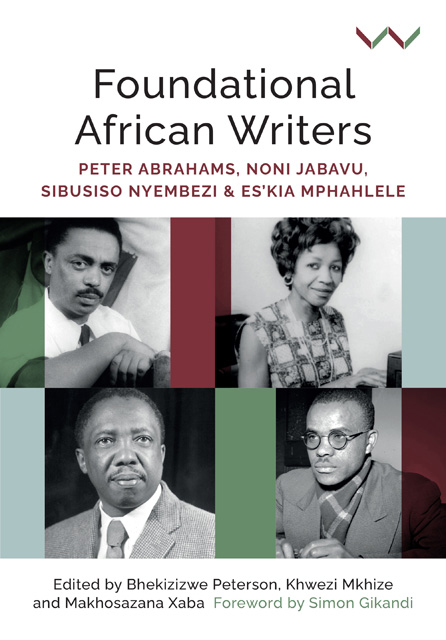Book contents
- Frontmatter
- Contents
- List of illustrations
- Foreword
- Acknowledgements
- Tribute to Professor Bhekizizwe Peterson
- Introduction
- Part I Remapping and Rereading African Literature and Cultural Production
- Part II South Africa and Fugitive Imaginaries
- Part III In the Eye of the Short Century: Diaspora and Pan-Africanism Reconsidered
- Contributors
- Index
11 - Down Avenues of (Un)Learning: Reading, Writing and Being
Published online by Cambridge University Press: 01 September 2022
- Frontmatter
- Contents
- List of illustrations
- Foreword
- Acknowledgements
- Tribute to Professor Bhekizizwe Peterson
- Introduction
- Part I Remapping and Rereading African Literature and Cultural Production
- Part II South Africa and Fugitive Imaginaries
- Part III In the Eye of the Short Century: Diaspora and Pan-Africanism Reconsidered
- Contributors
- Index
Summary
Es’kia Mphahlele invites the reader to explore a richly textured township world in Down Second Avenue and then to travel with him through the continent and beyond in Afrika, My Music, experiencing the alienation and longing of exile but also remaking and creating possibilities for belonging and being ‘at home’. The narratives of these autobiographical texts are deeply personal in their descriptions of everyday life in particular places and in particular times. However, through an account of this one grand but quotidian life, Mphahlele provides a complex engagement with psychological and political questions of subjectivity or ways of being in the world. In this chapter I reflect on my own early entry into literature, reading Mphahlele in the early 1980s, and reflect on the traces of this learning history in my present thinking as a narrative psychologist. In Paulo Freire’s language, this is an exploration of learning to read the word and the world and, in the language of narrative psychology, it is about the process of learning to read and write our-selves in dialogue with others. I am interested in the possibilities that Mphahlele’s work, and literature in general, offer for thinking about the academy in the current historical moment; about learning and teaching, and about different forms of making sense of the world. In particular, the possibilities and difficulties of interdisciplinary thinking, reading and writing are explored via Chabani Manganyi’s biography of Mphahlele, Exiles and Homecomings, suggesting an interplay between narrative and psychology. I will explore three lines of enquiry suggested by Mphahlele, by Manganyi’s reading of Mphahlele, and by my reading of them both, then and now:
1. narratives of (un)learning to read words and worlds;
2. (auto)biography for writing ourselves and others;
3. narrative as a theory-method for understanding human life.
Narratives of (un)learning to read
As Jeanette Winterson’s mother warned, ‘the trouble with a book is that you never know what’s in it until it’s too late!’ This is the delight and the danger of reading – it opens new worlds and may cause us to lose our grip on current realities and even ourselves. The act of reading is therefore potentially both psychologically and politically provocative.
- Type
- Chapter
- Information
- Foundational African WritersPeter Abrahams, Noni Jabavu, Sibusiso Nyembezi and Es'kia Mphahlele, pp. 237 - 256Publisher: Wits University PressPrint publication year: 2022



